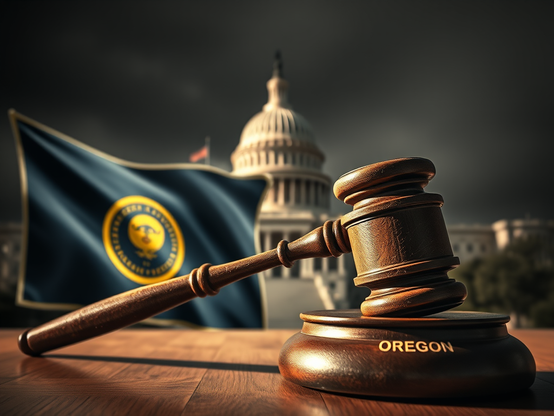States’ Rights and Federal Reach: What the 9th Circuit Just Did in Oregon – DWD Report
Editor’s Note: A Special Update on National Guard in Oregon, 9th Circuit Ruling. I asked ChatGPT some questions about federal and states rights, and asked for input on the opinion today, and provide context. My partner did good… –DrWeb
States’ Rights and Federal Reach: What the 9th Circuit Just Did in Oregon
The Ninth Circuit Court of Appeals has handed down a 2-1 decision that reignites an old American debate — the balance between states’ rights and federal power.
At issue: whether President Trump could federalize members of the Oregon National Guard over the objections of the state’s own leaders, including the governor and Portland’s mayor, during what were by all accounts peaceful public demonstrations.
The case, State of Oregon v. Trump (No. 25-6268), comes with a dense 93-page opinion — the majority allowing the federalization to proceed, and a sharply worded dissent by Judge Susan P. Graber warning that the decision “erodes core constitutional principles” of state sovereignty.
Editor’s Note: Full opinion embedded below.
9thcircuitrulingDownload What “States’ Rights” Really Means
The phrase itself doesn’t appear in the Constitution, but the idea is embedded throughout it — particularly in the Tenth Amendment, which says that any powers not granted to the federal government are “reserved to the States respectively, or to the people.”
In plain terms, this means states hold their own sovereign authority over matters the federal government has not claimed. But that authority isn’t absolute. When Washington acts under powers clearly granted by the Constitution — say, national defense or executing federal law — the Supremacy Clause makes those federal actions “the supreme law of the land.”
That’s the tightrope of American federalism: state sovereignty versus national supremacy. The courts are where that rope gets tested.
What the Court Said
The majority opinion leaned heavily on 10 U.S.C. § 12406(3) — a statute allowing the President to federalize the National Guard when regular forces are “unable to execute the laws of the United States.” The two judges in the majority accepted that the President had a “colorable basis” for doing so, meaning a plausible, legally defensible reason, even if the state argued the protests were peaceful and local officials said no help was needed.
They emphasized judicial deference — the notion that courts generally should not second-guess a President’s national-security or law-enforcement judgments. By that measure, they said, the federal government acted within its legal rights.
The Dissent: A Warning on Sovereignty
Judge Graber’s dissent, beginning on page 74 of the opinion, takes direct aim at that logic.
She argued the majority’s reasoning stretches federal power too far — letting Washington override a state’s authority to control its own militia without meeting the true emergency threshold Congress intended.
Her opinion underscored that no recent evidence of violence existed, that Oregon’s Guard was not refusing to carry out its duties, and that the state’s elected leaders had said no.
To her, the court’s deference was misplaced: it “displaces the sovereign authority of the people of Oregon in favor of speculative executive power.”
Why It Matters
This case isn’t just about one deployment. It touches the very structure of how power is shared in the United States.
If the federal government can federalize a state’s Guard over peaceful demonstrations and state opposition, where does that leave the Tenth Amendment?
Conversely, if states can block the federal government from enforcing federal law on federal property, what happens to national authority?
Final Take
So yes — the decision does implicate states’ rights, but it doesn’t automatically violate them.
The court’s job was to decide whether federal power was used lawfully. The majority said yes; the dissent said no.
The tension between state sovereignty and federal supremacy is as old as the republic — and, as Oregon just reminded us, still unsettled business.
Sources
- “State of Oregon v. Trump, No. 25-6268 (9th Cir. 20 Oct. 2025).” United States Court of Appeals for the Ninth Circuit, https://cdn.ca9.uscourts.gov/datastore/opinions/2025/10/20/25-6268.pdf .
- Graber, Susan P., dissenting opinion, pp. 74–93.
- “U.S. Appeals Court Lets Trump Send Troops to Portland.” Reuters, 20 Oct. 2025, https://www.reuters.com/world/us/us-appeals-court-allows-trump-send-troops-portland-oregon-2025-10-20/ .
- “Trump Can Send Troops to Portland, Appeals Court Says.” The Washington Post, 20 Oct. 2025, https://www.washingtonpost.com/politics/2025/10/20/portland-national-guard-troops-court-trump/ .
- “9th Circuit Rules That National Guard Can Deploy to Portland, but Legal Questions Loom.” Oregon Public Broadcasting, 20 Oct. 2025, https://www.opb.org/article/2025/10/20/ninth-circuit-national-guard-troops-can-deploy-portland/.
#2025 #9thCircuit #America #Dissent #DonaldTrump #Education #Health #History #JudgeBridgetSBade #JudgeRyanDNelson #JudgeSusanPGraber #Libraries #Library #LibraryOfCongress #NationalGuard #October20 #Opinion #Oregon #Politics #Portland #Resistance #Science #Trump #TrumpAdministration #UnitedStates






